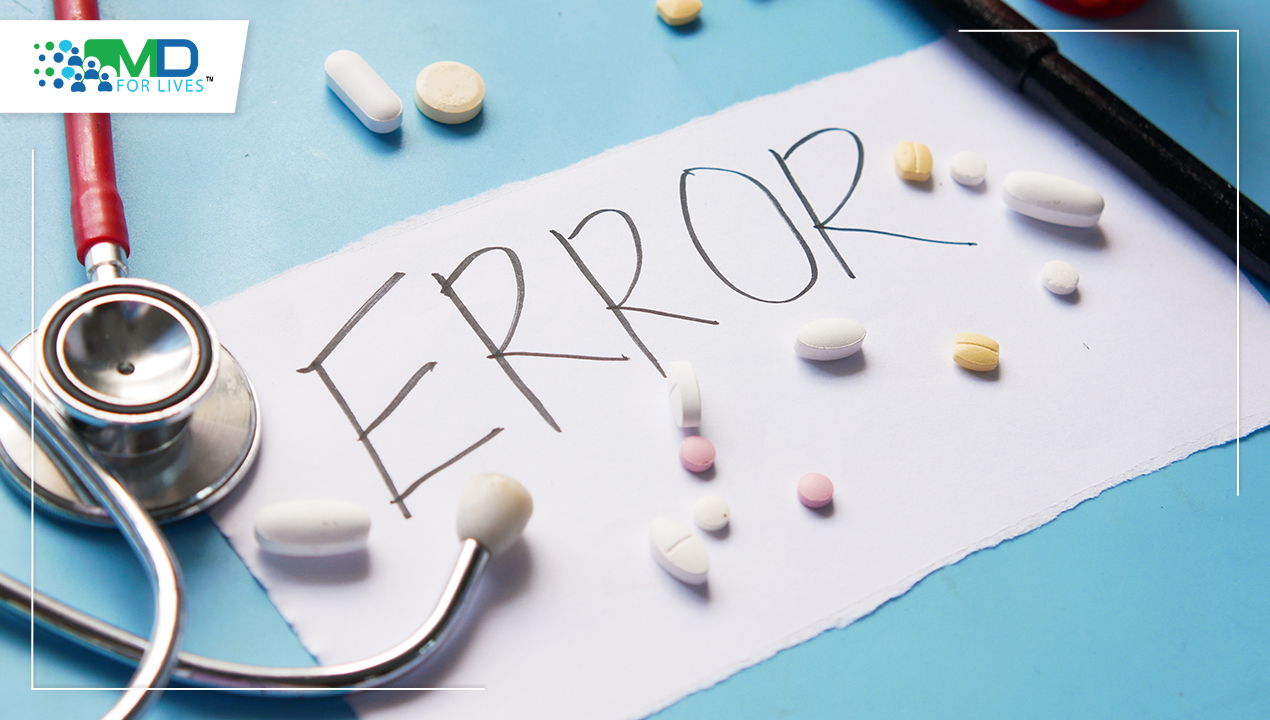Although medical science continues to advance every day, as you flip through the pages of newspapers or scroll through your social media feed, you will undoubtedly come across numerous reports related to ‘Medication Errors.’ Are physicians solely at fault or are pharmaceutical companies to blame, or could it be a combination of both? Well, all your queries will be addressed! As we step into National Healthcare Quality Week (15th – 21st), it’s a fitting time to delve into the heart of this pressing issue that has plagued the healthcare industry. But before we proceed, here’s a noteworthy statistic:
Medication errors cost the US an estimated $42 billion annually. A study found that in the US, up to 6.2% of prescribed medications and in the UK, up to 1.5% are affected by errors during hospital stays.

Medication errors can have severe consequences, impacting patient health and, in some instances, resulting in serious harm or even fatalities. However, there is hope on the horizon, with physician-led initiatives playing a pivotal role in reducing medication errors and enhancing healthcare safety.
UNDERSTANDING MEDICAL ERRORS IN HEALTHCARE
Medication errors encompass a range of mistakes, from prescribing the wrong medication to administering it incorrectly. These errors can occur at any stage of the medication process, from prescription to administration, and can result from various factors including – miscommunication, lack of standardized processes or sometimes, even technological glitches.
MEDICATION ERRORS: KNOW IN-DEPTH ABOUT THEIR IMPACTS

Medication errors are not isolated incidents; they have far-reaching consequences for patients, healthcare providers and the healthcare system as a whole!
Some of the consequences are as follows:
- Risking Patient Safety: Patients are the most directly affected by medication errors. These errors can lead to adverse reactions, prolonged hospital stays or even irreversible harm.
- Increased Healthcare Costs: Medication errors contribute to rising healthcare costs due to the need for additional treatments, extended hospital stays and legal proceedings.
- Diminished Trust: Medication errors can disrupt a patient’s trust in healthcare providers and the system, which can be challenging to rebuild.
PHYSICIAN-LED INITIATIVES FOR REDUCING MEDICATION ERRORS
Physicians, as frontline healthcare providers, are in a unique position to lead the charge in reducing medical errors. Here are some physician-led initiatives that are making a difference:
1. Electronic Prescribing Systems: Many physicians have adopted electronic prescribing systems also known as e-prescribing, which help reduce errors related to illegible handwriting and dosage miscalculations. These systems also provide real-time alerts for potential drug interactions.

Digging the history: Only after receiving approval from the Medicare Modernization Act (MMA), e-prescribing was brought into the spotlight in the year 2003. Since then, till today, the usage of electronic prescribing systems has increased in leaps and bounds! As per a survey conducted in 2021, 94 percent of all prescriptions filled were e-prescriptions.
2. Medication Reconciliation: Physicians are increasingly focusing on accurate medication reconciliation during transitions of care to reduce medical errors in healthcare.
You may wonder, why is medical reconciliation vital? Here’s the reason – According to the Institute of Medicine’s Preventing Medication Errors report, inadequate reconciliation during patient admission, transfer and discharge is responsible for over 40 percent of medication errors, with approximately 20 percent of these errors resulting in harm.
3. Enhanced Communication: Effective communication among healthcare providers is crucial to ensuring that everyone involved in a patient’s care is aware of the prescribed medications and any potential issues. Hence, if you are an ambitious physician or a physician in making, first learn the art & science of Patient-Doctor communication.

4. Patient Education: Physicians are taking the time to educate patients about their medications, including proper administration, potential side effects and the importance of adherence.
5. Quality Improvement Initiatives: Physicians all around the globe are actively participating in quality improvement initiatives within their healthcare organizations, working collaboratively to identify and address the root causes of medication errors.
Please note: One of the major reasons why Pharma companies and other healthcare research institutions conduct medical surveys is to understand how to improve the medications or figure out ways to prevent medical errors. In fact, online medical surveys are an excellent avenue for physicians to earn! But first, you need to know how to take surveys and earn rewards.
6. Leveraging Technology: Physicians are embracing technology, including Clinical Decision Support Systems (CDSSs), to access up-to-date drug information and make informed prescribing decisions.
CONCLUSION:
During National Healthcare Quality Week, we recognize healthcare professionals’ pivotal role in reducing medication errors and improving healthcare quality. MDforLives, a platform for healthcare professionals and patients, supports this mission by providing opportunities for valuable insights through paid surveys, interviews and discussions. Your involvement as a panelist contributes to healthcare improvement.
Together, we can create a future with fewer medical errors in healthcare!
References:
- Rate of electronic prescriptions in the United States from 2017 to 2021
Source: statista.com - Pros and Cons of E-Prescribing in Community Pharmacies
Source: uspharmacist.com - Medication Reconciliation
Source: ncbi.nlm.nih

MDForLives is a global healthcare intelligence platform where real-world perspectives are transformed into validated insights. We bring together diverse healthcare experiences to discover, share, and shape the future of healthcare through data-backed understanding.






